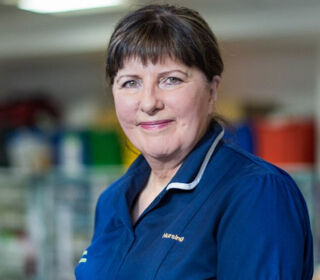
Blog

Senior Lecturer in Nursing Ann-Marie Dodson shares her story and gives advice about joining our School of Nursing and Midwifery.
What do you do at BCU and how long have you been part of the University?
I’m a senior lecturer in Nursing in the pre-qualifying department of the School of Nursing and Midwifery. I joined the University when it was UCE in 1995 from the QE college of Nursing as a clinical teacher to help train and educate intensive care nurses.
Over time I have had many roles, from being a Route Director alongside 42 staff delivering 23 degrees and 120 modules to qualified nurses to currently being part of a team of five, delivering education and training to over 900 students a year.
I like to get involved in some of the extra-curricular activities with staff and students, such as the BCU half marathon and educational programmes abroad.
Could you tell us about your experience and how this feeds into your teaching?
I have continued to work clinically throughout my academic career in intensive care and re-joined the NHS to support the vaccination programme. This helps maintain my credibility and ensures that I can share practice with nursing students.
My outside interests and travels outside the UK has meant that I have spent time with indigenous peoples such as the Uighars in China. I have spent time with non-governmental organisations and had to do extra training to be able to exist in remote environments. All this learning has informed my teaching, for example in relation to culture, disease patterns and public health issues. I am able to involve students in some of my activities related to a nursing charity to which I am the regional ambassador and my love of the outdoors.
What are some of the greatest achievements you have accomplished at BCU?
I have been involved in many innovations and the development of new curricula. My job satisfaction comes from seeing students graduate and develop as newly-qualified nurses.
One of my most special moments was taking a group of students and staff to Everest base camp and climb Kala Pattar, as well as visiting hospitals and clinics in Kathmandu. I have also taken part in an educational exchange to Pittsburgh with some of our students, where we were able to compare and contrast nursing education and care in the US as opposed to the NHS and UK.
What makes the courses you teach on distinct and what is the learning environment like?
As an experienced external examiner myself I am well placed to comment on my Faculty and the courses I work on. Although we deal with a large number of students, we can achieve high standards as all the teaching staff are experts, motivated and committed to work to the same vision.
We are lucky to have staff from diverse backgrounds and many from overseas which means students have role models and we can show what is possible with dedication and hard work.
The learning environment is constantly evolving as staff bring in new innovations. We have expertise in blended learning techniques and vary our teaching methods depending on the student numbers and type of learning which will suit the situation best. The flexibility and adaptability of the team is a real strength. We want to be the best and want our students to be the best nurses possible.
Why do you think Birmingham is a good place to study?
I trained myself in Birmingham for a reason, and that hasn’t changed. It is as true today as it was back in 1977 when I started my nursing. As the second city, we have a huge variety of clinical placements and specialities. The population we serve is diverse. The nature of our nurse education and training, as well as the profile of staff reflect this, as we value inclusivity and individualism.
Birmingham is a vibrant place with plenty of excellent music, sporting and food venues with excellent transport networks.
What can students do to help prepare them for the courses you teach?
Some care, work experience or volunteering experience is always useful. Ensuring that a student has an adequate device such as computer or laptop to access the virtual learning environments rather than relying on a phone will really help, as will good study skills and thinking seriously about what barriers to study there may be. Good self-awareness of personal strengths and limitations will help also.
What’s your favourite thing about working at the University?
My favourite thing is the people. BCU are my surrogate family. It is a real community and team. Many colleagues who are not nurses and not necessarily central to my work are very important to me, such as the IT, security and admin staff. We are a team. A beaming smile and a hello can make my day.
I know anyone will try and help a visitor or student if asked or, it is noticed that they need help. I am proud of BCU. We don’t just “talk the talk but walk the walk”. The fact that many staff were students and many staff continue their academic development within BCU speaks volumes, I think.
Nursing and Midwifery Courses
Find out more about our courses